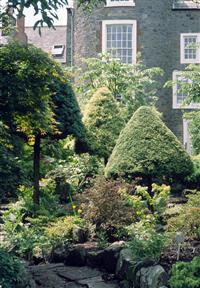Study Ornamental Horticulture by Distance Learning
An extensive course for anyone working or wanting to work in care of parks.

- Designed to teach the basics of how to identify, grow and maintain ornamental plants and gardens in any climate.
- Learn about horticulturally valuable plant varieties.
- Cover garden maintenance, turf care, arboriculture, landscaping and nursery work.
- Highly experienced and knowledgeable tutors.
- Study in your own pace in your own time.
An excellent course for anyone wanting to work in ornamental horticulture.
This course is designed for anyone working in, or wanting to work in, the care of gardens – private or public.
- Build a foundation in all of the things a gardener might need to deal with from pruning and pest control to fertilising and mowing grass.
- Develop general and broad based skills in horticultural practices and plant identification.
- Learn more specific knowledge in areas of ornamental horticulture including garden maintenance, turf care, arboriculture, landscaping and nursery work.
COURSE STRUCTURE AND CONTENT
The Certificate in Horticulture involves the areas of work:
- CORE STUDIES – this involves at least 350 hours, divided into 15 lessons, approx. half of the course.
- ELECTIVE STUDIES – this involves a further 350 hours of study going into greater depth in the areas of garden maintenance, nursery practices and landscaping.
- EXAMINATIONS – to pass the Certificate, students are required to take 2 exams for the Core modules and 2 for the Stream modules (i.e. 4 exams in total). Additional fees are payable for each exam.
CORE STUDIES:
1. Introduction to Plants
- Nomenclature and taxonomy, the plant kingdom, genus, species, hybrids.
2. Parts of the Plant
- How plants grow, plant structure, parts of the flower and leaf, modification of stems and roots.
3. Plant Culture – Planting
- How to plant and protect newly planted specimens, terms like: annuals, biennials, perennials, deciduous, evergreen and herbaceous plants.
4. Plant Culture – Pruning
- Purpose for pruning, rules for pruning, how to prune.
5. Plant Culture – Irrigation and Machinery
- Different irrigation systems, components of an irrigation system, designing an irrigation system, selection, use and maintenance of machinery and tools.
6. Soils & Media
- Soil classifications, testing soil, potting mixes, the U.C. System, ingredients of potting mixes.
7. Soils & Nutrition
- Fertilisers – deficiencies and toxicities, N:P:K ratios, salting, fertiliser programming, compost.
8. Propagation – Seeds & Cuttings
- How to propagate plants by seed and cuttings, propagating mixes, cold frame construction, after care for young plants.
9. Propagation – Other Techniques
- Other methods to increase plant numbers – budding, grafting, layering, division and tissue culture.
10. Identification and Use of Plants
- How are plants used in the landscape, how to choose and purchase plants, selecting plants suitable for the climate and site.
11. Identification and Use of Plants
- Problems with plants and choosing plants for problem sites.
12. Identification and Use of Plants
- Indoor and tropical plants, flowers, herbs, bulbs, ferns.
13. Pests
- Identifying and controlling pests, chemical and natural methods for control, chemical safety precautions.
14. Diseases
- Identifying and controlling diseases, plant pathology, fungi, viruses, non-pathogenic problems, interactions with the host and the environment.
15. Weeds
- Identifying and controlling weeds, chemical terminology.
STREAM STUDIES: ORNAMENTAL HORTICULTURE
This part of the course involves 4 main areas of study, as follows:
- Landscaping
- Plant knowledge
- Plant Care
- Nursery Practices
Scope of stream studies:
- Landscape design (including pre-planning and drawing plans).
- Principles and styles of landscape designs.
- Analysis of garden designs.
- Graphic skills, materials and techniques.
- Estimating costs for landscape jobs.
- Surfacing materials and their effects.
- Quality and cost of different landscape materials.
- Plant knowledge, both native and exotic, suitable for local conditions.
- Plant selection for difficult sites and conditions (including treating degraded sites and interior plantscaping).
- Tropical and indoor plants.
- Environmental factors important for indoor plant culture.
- Bulbs, perennials and annuals.
- Planting design for flower beds (annuals and bulbs) suitable for your locality.
- Herb culture and garden design.
- Miscellaneous growing techniques including; bonsai, terrariums, pot culture, baskets and hydroponics.
- Describe the importance of trees to humans.
- Procedures for the proper and safe removal of a limb from a tree.
- Tree problems and their treatment.
- Compartmentalisation, and its effect on the spread of disease in trees.
- Preparing a detailed maintenance program for a garden.
- Seed selection, storage, preparation and spreading (sowing).
- Preparation, planting and establishment of a lawn.
- Establishing turf on a steep slope.
- Turf maintenance techniques.
- Analysis of nursery production systems.
- Preparing a flow chart for the production of a particular plant, from propagation to marketing.
- Preparing a maintenance program for green life in a garden centre.
- Preparing guidelines for the disposal of surplus or below standard stock in a nursery.
- Write an advertisement for a nursery or garden maintenance business.
- Basic management procedures for a single person nursery or garden maintenance business.
- Basic communication skills.
- Health and safety requirements for a nursery or garden maintenance workplace.





